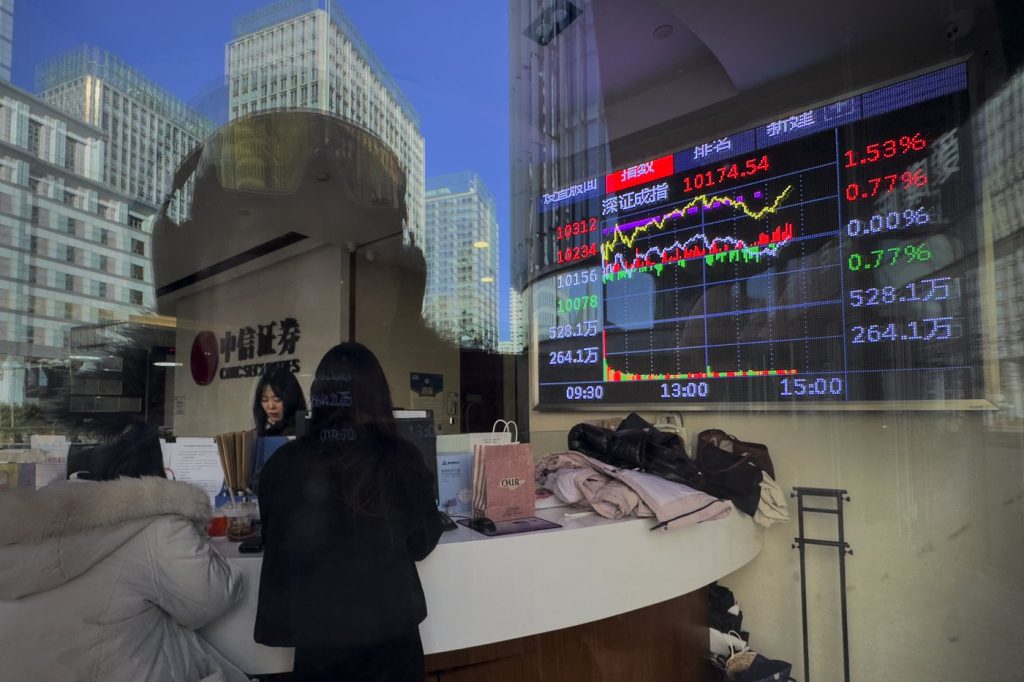TOKYO (AP) — Asian shares mostly rose on Thursday following U.S. President Donald Trump’s agreement with Russian leader Vladimir Putin to initiate talks aimed at ending the war in Ukraine. This development fueled optimism in Asian markets, particularly with speculation regarding Trump possibly pausing some tariffs he had previously announced.
The increase in Asian markets occurred even as Wall Street experienced a decline on Wednesday, influenced by a report indicating worsening inflation for American consumers. Japan’s benchmark Nikkei 225 climbed 1.3% in the morning session, reaching 39,474.80. Concurrently, Australia’s S&P/ASX200 rose 0.2% to 8,550.70, South Korea’s Kospi gained 0.9% to 2,572.37, and the Hang Seng index surged 0.9% to 22,051.16, while the Shanghai Composite edged down 0.2% to 3,339.22.
On Wall Street, the S&P 500 saw a decrease of 0.3%, managing to recover somewhat from an initial expected loss of 1.1% at the start of trading. The Dow Jones Industrial Average fell by 225 points or 0.5%, while the Nasdaq composite saw a slight increase of less than 0.1%. The overall downward trend in Wall Street’s momentum was underlined by a drop in oil prices, with benchmark U.S. crude decreasing by 2.7% to under $72 per barrel after Trump’s announcement regarding negotiations with Russia.
In the energy sector on Thursday, benchmark U.S. crude fell by 62 cents to $70.75 per barrel, while Brent crude declined by 65 cents to $74.53. The decline in oil prices adversely impacted oil and gas companies on Wall Street, prompting Exxon Mobil to plunge by 3% as shares of energy firms fell broadly following a 2.4% drop in Brent pricing on Wednesday.
Market analysts noted that Wall Street's overall sentiment continued to tilt toward the negative side. A report indicated that U.S. consumers faced higher living costs, including rising prices for eggs and gasoline, resulting in increased pressure on financial markets. The report unveiled an overall inflation rate of 3% for U.S. consumers in January, surpassing the expected 2.9% inflation rate for December.
This inflation report underscored the growing financial strain on U.S. households and revealed that traders had accurately anticipated that the Federal Reserve would likely provide less monetary relief through lower interest rates this year. The Fed had previously decreased its main interest rates significantly from September until the end of the last year to stimulate borrowing, aid the economy, and boost investment prices. However, the Fed has indicated concerns about persistent inflation, which may hinder further rate cuts in 2025.
Amidst January's disappointing inflation data, market expectations escalated, projecting a 29% chance that the Fed would refrain from cutting rates at all this year, an increase from below 20% before Wednesday's consumer price index report. Consequently, the yield on the 10-year Treasury rose to 4.62% from 4.54%, fueling investor caution over stock purchases, which are perceived as higher-risk investments compared to safer Treasury bonds.
In the realm of corporate earnings, CVS Health saw a notable increase of 14.9% after surpassing Wall Street’s revenue and profit expectations for the latest quarter. Meanwhile, ride-hailing app Lyft suffered a drop of 7.9% despite posting stronger-than-expected earnings.
Overall, the S&P 500 fell by 16.53 points to close at 6,051.97. The Dow Jones Industrial Average saw a decline of 225.09 points to end at 44,368.56, while the Nasdaq composite gained a modest 6.09 points, reaching 19,649.95. In currency trading, the U.S. dollar slipped to 154.22 Japanese yen from 154.31 yen, while the euro increased to $1.0404 from $1.0386.










